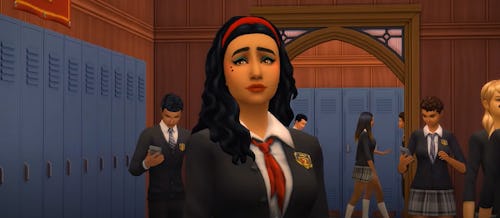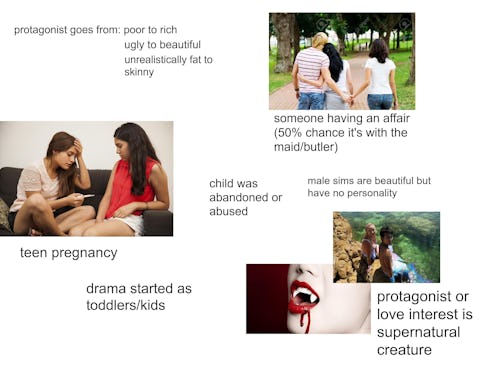
In 2009, Boss was disappointed with the direction that her favorite television show, Glee, was headed.
The musical teen drama was in its second season, and from Boss’ point of view, the storylines were predictable and going nowhere fast. But rather than complaining on the internet, she wrote a skit about it.
Boss comes from a creative family, so she didn’t pursue the endeavor alone. She dragged her brother into the room, and the pair recorded themselves acting out the Glee spoof she’d crafted. She was obsessed with The Sims at the time, and used the video game to create and direct the characters of her amateur production — a process known as machinima (a portmanteau of the words machine and cinema.)
Her efforts were well-received. “I put it up on Christmas Day, and somehow it found its way to Tumblr — I had no idea what that was at the time,” says Boss, now 30, who lives in California. (Boss asked Input to withhold her real name for her privacy.) “Then it got like 20,000 views in one day, which was crazy. I wasn’t looking for an audience or anything in the way people might do now on YouTube. I just wanted to see if other people found my sense of humor funny.”
More than a decade later, Boss’ YouTube channel SimgmProductions has just under one million subscribers and generates enough revenue that she can run it full-time. And it’s still a family affair: Her brother and sister work with her. Today, they’re still creating parodies — including Kardashian-themed takes on famous films like Mean Girls and Titanic — many of which have gone viral on YouTube and TikTok.
Boss is one of the few modern-day success stories in The Sims machinima world, once an enormous force on YouTube that brought in millions of views. These days, public interest in the productions has waned dramatically, but she and other creators carry on, driven by a passion for a game that they love and a desire to tell stories.
For 27-year-old Mariam Tarkeshi, a young adult author and Sims machinima creator from Italy, the allure of making machinima has always been in its accessibility. “I really loved the idea of creating movies and TV shows, but filmmaking isn’t something that's readily accessible for a 14-year-old,” she says. “It was an opportunity.”
She says that the YouTube machinima account she ran as a teen pulled in a much larger viewership than her current account, Simmer Boi, which gets a couple thousand views per video at most. But Tarkeshi accepts that times have changed. “YouTube was a very different place a few years ago,” she says. “There’s a lot more content on YouTube in general, and a lot more people. The views are kind of scattered across loads of creators, and it’s harder to get noticed.”
And yet she perseveres because she loves the high drama and the complete freedom the machinima world offers her. She describes her current project, a “TV show” entitled Ward University, as a cross between The O.C and BoJack Horseman. She uses several actors to help her voice the characters — although no one is making an income from the videos. “But I’m having fun,” she says. “That’s what keeps me motivated.”
‘Arduous task’
It is difficult for Sims machinima makers to keep up with the metabolism of today’s YouTube, where more and more creators are constantly churning out more and more videos.
“Making a machinima requires a lot of work and time — a few days to several months, depending on the length of the movie and its complexity,” says Remi Marocelli, a 32-year-old artist and illustrator from France who makes machinima using The Sims. “It’s an arduous task that requires modifications and the tweaking of game files to get a convincing result.”
Marocelli’s YouTube channel, which is mostly dedicated to an existing Sims character, the red dress–clad Bella Goth, used to draw in millions of views. Now, his videos only get thousands of views each. But he, like others in the dwindling niche, is motivated by a small but dedicated following and the love of his craft, which he’s been at since 2010.
“I keep on making them because I like it and I’m good at it, and I’m gaining skills and experience with each new video — whether it’s in editing or in other fields,” says Marocelli, who is currently working on a multi-part origin story for Goth’s character.
He has faith that Sims machinima could rise again if game maker EA would only step in. “My wish is that The Sims team will put the spotlight on machinima as they did in the previous iterations,” he says, “because there are very talented people in this community who deserve to be known and recognized.”
Boss isn’t so hopeful about the art form. She finds the focus of many of them to be boring. “It's kind of like they’re trying to be an art house film. There are a lot of deaths and vampires,” she says. The dramatic content of Sims machinima has become the butt of jokes on Reddit, where fans of the game often mock the genre’s repetitive tropes.

“I don't even know if I would say they’re bad because it's all subjective, and sometimes they’re beautiful to look at,” Boss says, “but I don't need to see a hand slowly buttering some toast. Or watch a plotline where someone’s eating breakfast and then you suddenly find out they’ve killed their child.”
She feels that SimgmProduction’s focus on comedy — a genre sorely lacking in the world of machinima — is what keeps her viewers coming back for more. “There’s not a high rewatch value, in my opinion, for something that’s really dark and dramatic,” she says. “You don’t hear people say they’ve watched Schindler’s List or Sophie’s Choice every day — they watch Seinfeld or Golden Girls.”
Boss intends to continue making machinima for as long as she possibly can. “It’s weird because we’ve actually continued to grow, even though the whole trend of machinima has kind of died out,” she says. “I can’t really picture myself doing anything else, so I throw myself into it 100 percent every time. I think that makes a difference.”







